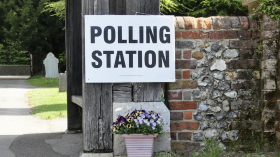Sue Robb of 4Children talks to Julie Laughton and Alison Britton from the Department for Education about the role of childminders in delivering the 30 hours free entitlement.
Local leaders to be given power to regenerate communities

The government has introduced plans to transform struggling towns and cities through the Levelling Up and Regeneration Bill.
The Bill will support local leaders to take back control of regeneration, to fill empty shops on their high streets and deliver the quality homes that communities need.
The government aims to "level up the UK" - to increase and spread prosperity and opportunity across the UK, and break the link between geography and destiny. The Bill puts the legal foundations needed to deliver this mission in place, so that all parts of the country will be able to share equally in our nation’s success.
Measures include creating a legal duty for the government to set and report on a number of missions for levelling up the country.
These missions will include: closing the gap in pay and productivity between the richest and poorest areas, effectively eradicating child illiteracy and innumeracy, closing gaps in healthy life expectancy, getting the rest of the country’s transport connectivity much closer to the standards of London’s, and making sure everyone has a local community they can be proud of.
The deadline for each mission is 2030, but the Levelling Up Bill will create a duty for the government to report on progress annually.
The Bill will provide the legislation needed so that every part of England that wants a strong devolution deal can have one, and enabling more areas to have the kinds of devolved powers which currently only the largest cities enjoy.
There will also be new provisions on council borrowing to protect taxpayers’ money while enabling local areas to make much needed investment.
The Bill will also directly give local leaders the powers they need to regenerate their communities, and transform their high streets and town centres. A new infrastructure levy will see the big developers contribute more towards better local roads, schools, hospitals, and genuinely affordable housing. Communities will also receive a share of the Levy revenue raised - as long as they have a parish or town council.
Measures include new powers for local leaders to run High Street Rental Auctions, where they can auction off tenancies in shops that have been vacant for over a year. This will help to end the plague of empty shops that blight so many high streets.
Councils will also be able to double council tax on empty and second homes, ensuring everyone pays their fair share towards local services and boost levelling up.
The ‘al-fresco dining revolution’ will be made permanent, injecting new life into the high street through creating a sustainable process for communities, business and local authorities, making it permanently cheaper and quicker to get a licence for outdoor dining.
A new, locally set infrastructure levy, charged on the final value of property when its sold, will replace much of the broken S106 payments system. This will see the big developers contribute far more of the money they make from development towards building better local roads, rail, schools, hospitals, and more affordable housing.
Legislation to make it easier for councils to regenerate their town centres through Compulsory Purchase Orders, making the process quicker and easier to use.
The Bill will also deliver new reforms to the planning system, ensuring new development is more beautiful, produces more local Infrastructure, is shaped by local people’s democratic wishes, improves environmental outcomes, and occurs with neighbourhoods very much in mind.
Company Focus
Located in Bromley, Japanese Knotweed Eradication Ltd has been providing solutions in the treatment and removal of Japanese Knotweed (Fallopia Japonica) for over a decade. During this time we have mastered a repertoire of methods, from herbicidal treatments to landscaping solutions, tailored to address the unique challenges our clients face with this pervasive weed.
Event Diary
UKREiiF has quickly become a must-attend in the industry calendar for Government departments and local authorities.
The multi-award-winning UK Construction Week (UKCW), is the UK’s biggest trade event for the built environment that connects the whole supply chain to be the catalyst for growth and positive change in the industry.
Supplier Profiles
Geo Energy
At GeoEnergy Design, we're on a mission to disrupt the traditional way heating and cooling ha
Latest Features
Professor Harith Alani, director of the Knowledge Management Institute at the Open University explains how AI can be used for good and bad.
Alex Lawrence, head of health & social care, techUK sets out techUK’s Five Point Plan for CareTech.

















